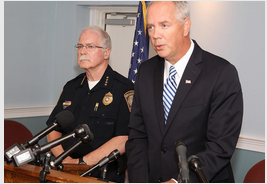Included in a stack of slide shows and other handouts from a two-day class held in 2013 by the International Association for Property and Evidence was a survey with 21 questions about department practices on evidence and property. Whoever filled out the survey – it doesn't say – wrote down "X" marks indicating "no" next to 11 of the practices.
September 14, 2015
BRAINTREE - Three years before officials discovered missing drugs and other problems in the Braintree police evidence room, a member of the force filled out a survey indicating that the department was not following even the most basic practices that police across the country use to ensure that evidence is not tainted, lost or stolen while in their custody.
Whoever filled out the survey, which was included in hundreds of pages of training documents provided in response to a Patriot Ledger public records request, also indicated that the department did not have a written policy for property management, even though a policy had been in place for more than a decade at that time. The survey suggests that the staff in the department's property room was following few of the requirements of that policy, which was issued by now-retired Chief Paul Frazier.
The town released the document earlier this week as it was completing an audit – expected to be released later today – that officials say could upend hundreds of criminal cases, including some that have already been dismissed. Town officials have also come under scrutiny for how soon they disclosed information about the department's mishandling of evidence after discovering the problems in May.
A person with direct knowledge of the investigation said it began around the same time that Susan Zopatti, the police officer charged with overseeing the property room, was found dead from a self-inflicted gunshot wound. Officials hired an outside firm to conduct an audit in June and District Attorney Michael Morrissey said this week that his office has already begun vetting about 3,000 Braintree cases from the period between June 2013 and May 2016, including 200 to 400 that will require a "hard look."
After first reporting on the audit last month, the Patriot Ledger requested copies of the department's policies, manuals and training documents related to evidence handling at the Braintree police station. The town provided hundreds of pages of documents in response, including several digital files on a CD and a 17-page policy on evidence handling.
Included in a stack of slide shows and other handouts from a two-day class held in 2013 by the International Association for Property and Evidence was a survey with 21 questions about department practices on evidence and property. Whoever filled out the survey – it doesn't say – wrote down "X" marks indicating "no" next to 11 of the practices.
The survey suggests that the department was not conducting annual inventories of property and evidence; that it did not store firearms in a separate facility; that it allowed people other than designated property custodians into the property room; that it did not did not keep track of how much money was stored in the property room; and that the room did not have an alarm monitored 24 hours a day.
Many of those practices would have been required under the department's evidence policy, which was issued more than a decade earlier in April 2002. The policy requires that guns be stored separate from other evidence, that cash be counted and itemized by denomination, and that a full inventory be conducted annually.



